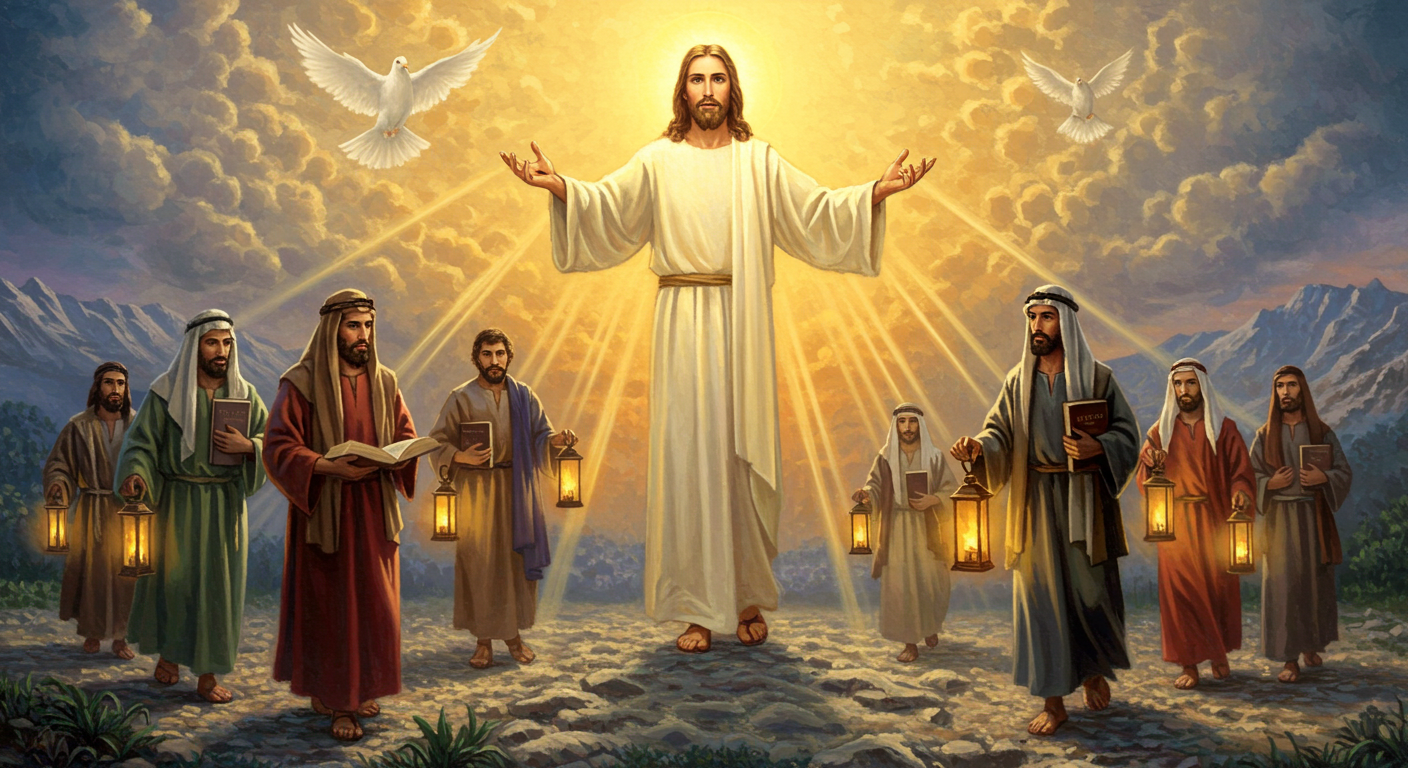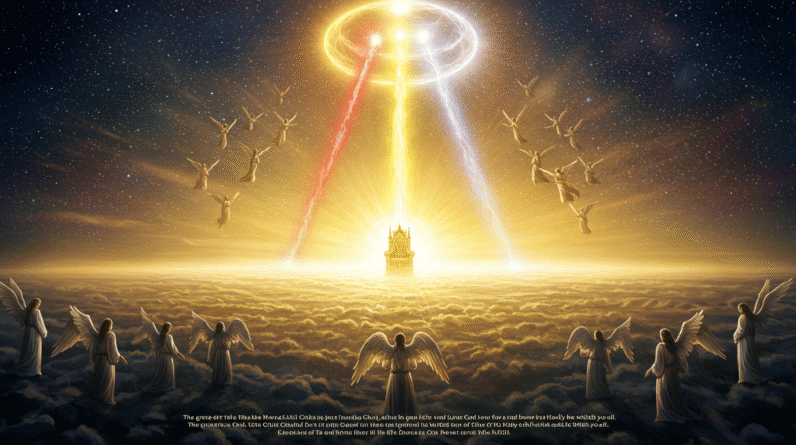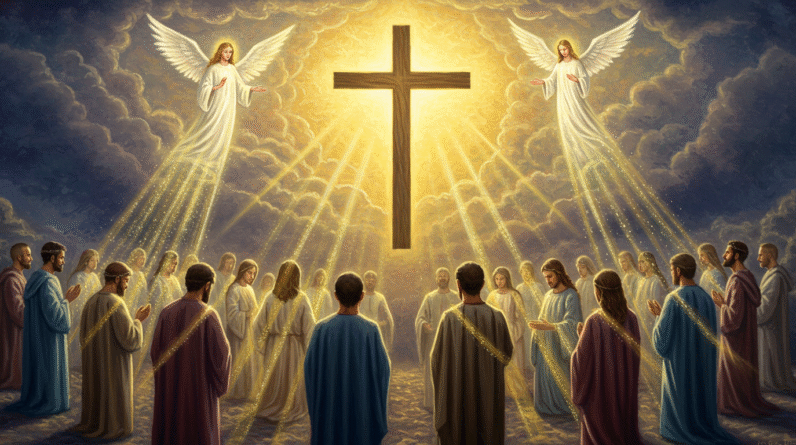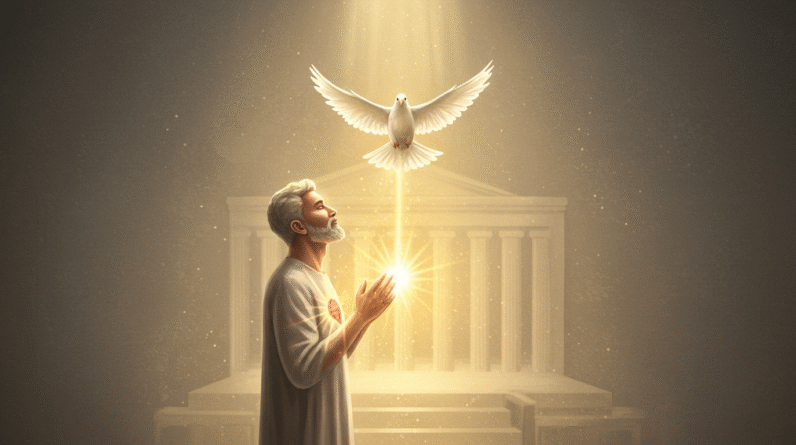The Trinity in Mission (Matthew 28:19)
You’ve likely heard the phrase “Father, Son, and Holy Spirit” many times in worship, catechism, or maybe at the end of a sermon. Yet when Jesus gave the Great Commission, He didn’t simply give a strategy for outreach — He gave a theological framework for mission. In a single, succinct command, He tied the church’s sending and sacrament to the life of the Triune God. In this article, you’ll explore how Scripture reveals One God in three Persons and how that revelation shapes your mission, prayer, worship, and life in Christ.
Matthew 28:19 — The Trinity in the Great Commission
When Jesus commissioned His disciples, He said, “Therefore go and make disciples of all nations, baptizing them in the name of the Father and of the Son and of the Holy Spirit” Matthew 28:19. Those words do more than define the form of baptism. They locate the church’s mission within the life of God. When you baptize, you are declaring that the one who sends, the one who saves, and the one who dwells with and in believers are not three distant forces but the one living God in three Persons.
Reading Matthew 28:19 in context
The broader paragraph helps you see the urgency and authority behind the command. Jesus begins, “All authority in heaven and on earth has been given to me,” and ends with the promise, “I am with you always, to the very end of the age” Matthew 28:18-20. The mission flows from the person and work of Christ, but its scope and power derive from the Father, Son, and Holy Spirit acting together. You don’t carry out a mission as an independent human project but as participants in the Triune sending.
“Baptizing them in the name of the Father, Son, and Holy Spirit”
The phrase “in the name” points to unity rather than three separate gods. The Greek uses singular language — one name, not three names — highlighting the oneness of divine life even as three persons are named. When you baptize in that singular “name,” you’re marking someone as belonging to the single reality of God who is revealed in Father, Son, and Spirit. This theological nuance shapes everything that follows in mission: authority, identity, community, and the presence of God with you.
The Trinity revealed from the Old Testament
Before the New Testament explicitly names Father, Son, and Spirit, the Old Testament plants seeds that prepare you to see God as both one and complex. The writers were guided by the same Spirit who later inspired apostolic teaching.
The Spirit at creation
From the very beginning, the Spirit is present in creation. “In the beginning God created the heavens and the earth. Now the earth was formless and empty, darkness was over the surface of the deep, and the Spirit of God was hovering over the waters” Genesis 1:1-2. This shows that God’s creative work involves the Spirit intimately. You learn that the Spirit is not a force but a Person of God who participates in the divine activity.
Plurality in creation language
God’s words about humanity also hint at plurality in the divine being. “Then God said, ‘Let us make mankind in our image, in our likeness’” Genesis 1:26. The plural pronouns don’t undermine monotheism; they signal a plurality within the single Godhead. To you, this invites humility: the mystery of one God who is relational by nature.
The Shema and monotheism
Israel’s confession underscores God’s oneness: “Hear, O Israel: The Lord our God, the Lord is one” Deuteronomy 6:4. Any doctrine of the Trinity must first be faithful to this uncompromising monotheism. The New Testament builds on that foundation and reveals how that one God exists eternally as Father, Son, and Spirit.
Messianic prophecy and plurality of persons
Prophecies that point ahead to the Messiah explain how God’s name and functions are shared within the Godhead. Isaiah speaks of a child called “Mighty God” who will be called “Prince of Peace” Isaiah 9:6. Psalm writers speak of a king and Lord in a way that interacts with Yahweh’s identity Psalm 110:1. These passages don’t exhaust the mystery, but they prepare your heart to recognize the fullness revealed in Jesus.
The Father: the sending, the heart of God
When you think of “Father,” you’re not thinking about an abstract principle. Scripture reveals Fatherhood as the personal source and origin within the Trinity, the one who plans redemption, loves the world, and sends the Son.
The Father’s love and initiative
The ultimate picture of the Father’s sending-love is found in John: “For God so loved the world that he gave his one and only Son” John 3:16. You see the Father’s heart: he initiates and gives. Mission begins with the Father’s love and purpose. Your mission roots in the Father’s will and initiative — you join his sending, not invent your own.
Father as the source of spiritual adoption
The New Testament also describes the Father as the one who adopts believers into his family through the Son and by the Spirit. Paul writes that you have received “the Spirit of adoption” and can call God “Abba, Father” Romans 8:15-16. Your assurance of belonging is grounded in the Father’s gracious decision to make you his child.
The Son: the Word made flesh, Savior, and Lord
When you read the Gospels and the letters, the Son — Jesus Christ — is at the center. He is both fully God and fully man, the one who accomplishes redemption for you.
The Word and creation
John begins with the cosmic sweep: “In the beginning was the Word, and the Word was with God, and the Word was God. Through him all things were made” John 1:1-3. The Son is not a created being; he is eternal and active in creation. You worship a Savior who is also the Lord of the universe.
The Word becomes flesh
John goes on to say, “The Word became flesh and made his dwelling among us” John 1:14. In Jesus, you encounter God who stoops to redeem. The Son’s incarnation is central to the mission because the mission is God coming into the world to restore what sin has broken.
The Son’s sustaining and atoning work
Hebrews calls Jesus “the radiance of God’s glory and the exact representation of his being,” sustaining all things and purifying sins by his sacrifice Hebrews 1:3. The New Testament repeatedly affirms that in Christ you have forgiveness, reconciliation, and new life. The mission announces that the work and calls people to trust in the Savior.
The Son’s humiliation and exaltation
Paul paints the path of Jesus: humility, obedience to death, and subsequent exaltation Philippians 2:5-11. Jesus’ death and resurrection are the hinge of mission. When you preach and live the gospel, you proclaim the One who humbled himself for your sake and was raised to be Lord of all.
The Holy Spirit: God’s presence and power
The Spirit is often less understood, yet Scripture shows the Spirit as the one who applies Christ’s work to your life and empowers the church for witness.
The Spirit was promised and given
Jesus promised the coming Helper and comforter: “I will ask the Father, and he will give you another advocate to help you and be with you forever — the Spirit of truth” John 14:16-17. The Spirit is personal, permanent, and divine. You don’t walk the Christian life alone; God gives you His Spirit.
The Spirit’s teaching role
Jesus also teaches that the Spirit will “teach you all things and will remind you of everything I have said to you” John 14:26. When you read Scripture and understand the gospel, it’s the Spirit applying Christ’s words to your heart. Your growth in grace depends on listening and obeying that divine teacher.
The Spirit’s witness to Christ
The Spirit testifies of Jesus: “But when the Advocate comes, whom I will send to you from the Father — the Spirit of truth who goes out from the Father — he will testify about me” John 15:26. The Spirit strengthens your witness so you can speak of Christ with power and boldness. Mission is not primarily a human effort; it’s the Spirit working through ordinary people like you.
The Spirit’s empowering for witness
In the book of Acts, you see the Spirit’s power for mission. Jesus told his disciples they would receive power when the Holy Spirit came upon them, and that power would enable them to be his witnesses Acts 1:8. The same Spirit equips you in prayer, proclamation, service, and perseverance.

The Trinity at work in the church and salvation
Scripture consistently shows that the Father, Son, and Holy Spirit are involved in your salvation in distinct but united ways: the Father plans, the Son accomplishes, and the Spirit applies.
The Father’s planning and purpose
Paul prays to the Father as the one who blesses believers with every spiritual blessing and who chooses and adopts believers for himself, Ephesians 1:3-6. Mission participates in the Father’s eternal purpose to gather a people for his name.
The Son’s accomplishment
Christ’s death and resurrection secure forgiveness and reconciliation. “God demonstrates his own love for us in this: While we were still sinners, Christ died for us” Romans 5:8. The mission proclaims what Christ has accomplished on the cross and through the empty tomb.
The Spirit’s application
The Spirit applies Christ’s work to your life — regenerating, indwelling, sanctifying, and sealing you until the day of redemption, Ephesians 1:13-14. Your faith, hope, and transformation are not products of your own ingenuity; they are gifts administered by the Spirit who testifies that you are God’s child Romans 8:14-16.
The Trinity and the church’s identity
The church is built on the presence of the Triune God. In the New Testament the Father, Son, and Spirit are invoked in apostolic blessings and communal life — for example, Paul’s benediction: “May the grace of the Lord Jesus Christ, and the love of God, and the fellowship of the Holy Spirit be with you all” 2 Corinthians 13:14. That blessing captures the Trinity’s relational warmth toward the church and orients your life and mission around that fellowship.
The Trinity in baptism and worship
The Triune formula in baptism links your initiation into Christ’s body with the threefold life of God. Baptism is not merely a ritual; it’s initiation into the communion of the Father, Son, and Spirit.
Baptism as initiation into the Triune life
When you baptize “in the name of the Father and of the Son and of the Holy Spirit,” you are declaring that the baptized person belongs to the one God who is Father, Son, and Spirit Matthew 28:19. Baptism marks entrance into the community that lives under the Lordship of Christ, enjoys the Father’s love, and is empowered by the Spirit.
Worship in Trinitarian language
Christian prayer and worship naturally reflect a Trinitarian shape. Paul says believers have access to the Father through the Son by the Spirit, Ephesians 2:18. Your prayers can be addressed to the Father, in the name of Jesus, and with the Spirit’s help — all distinct, all securing your relationship with the living God.
The Trinity in everyday Christian life
You don’t only encounter Father, Son, and Spirit in doctrinal statements; you experience them in the rhythms of grace and obedience.
The Spirit’s indwelling and transformation
The Spirit lives in you, guiding and renewing you. Paul explains that if the Spirit of God dwells in you, that same Spirit raised Christ from the dead and will give life to your mortal body Romans 8:9-11. That reality shapes your daily confidence: the resurrection life that raised Jesus is at work within you now.
Prayer: to the Father, through the Son, in the Spirit
The New Testament teaches a pattern of prayer that involves all three Persons. You are invited to approach the Father with confidence because of the Son and by the Spirit’s intercession, Ephesians 2:18. When you pray, recognize that you approach God’s throne as a child through the merits of Christ and with the Spirit’s help.
Fellowship and unity in the church
Paul urges believers to “make every effort to keep the unity of the Spirit through the bond of peace” and reminds you there is “one Lord, one faith, one baptism” Ephesians 4:3-6. The Trinity is the source of church unity — one God in three Persons who calls a diverse people into one body.
The Trinity and evangelistic urgency
The Triune God isn’t an object of mere speculation. He is the subject of the mission. Because the Father loves, the Son saves, and the Spirit empowers, you have the joyful urgency to tell others.
Sent by the Father, sent as the Son, sent in the Spirit
Mission is Trinitarian. The Father sends the Son, the Son sends the Spirit and the church, and the Spirit sends and empowers witness John 20:21-22. You join in this sending when you obey the Great Commission, baptize disciples, and teach them to obey everything Jesus commanded, Matthew 28:18-20.
Baptism and proclamation together
The pattern Jesus gave connects proclamation and sacrament. You preach the gospel, and as people come to faith, you baptize them “in the name of the Father and of the Son and of the Holy Spirit” Matthew 28:19. Baptism is not a substitute for preaching, but it publicly locates a person within the Triune life they now share by faith.
Addressing common questions and misunderstandings
You may wrestle with how God can be both one and three. That confusion is understandable; the Trinity is a mystery to be received in humble faith, not a riddle to be solved.
The mystery of one God in three persons
Scripture insists on monotheism while also revealing internal distinction. The Shema affirms one Lord, Deuteronomy 6:4, even as the New Testament names Father, Son, and Spirit together in ministry and mission. You hold together both truths: God is one in essence and three in persons. That is not a contradiction but depth.
Avoiding modalism and tritheism
Two errors should be avoided: modalism (God appearing in three modes rather than three persons) and tritheism (three separate gods). Both misunderstand Scripture. The biblical witness shows relational persons who interact with one another: the Father sends the Son, the Son prays to the Father, the Spirit proceeds and empowers John 14:26; John 15:26; John 20:21-22 [https://www.biblegateway.com/passage/?search=John+15:26&version=NIV] [https://www.biblegateway.com/passage/?search=John+20:21-22&version=NIV]. You stay faithful to Scripture when you confess both the unity and the personal distinctions within God.
The Trinity as comfort, hope, and holiness
The doctrine of the Trinity isn’t an abstract creedal item; it comforts you in suffering, sustains you in weakness, and drives you to holiness.
Comfort in the triune presence
Jesus promised his abiding presence: “And surely I am with you always, to the very end of the age” Matthew 28:20. That promise flows from the triune life. The Father’s love, the Son’s presence, and the Spirit’s indwelling mean you are never alone in the trials of life.
The Spirit’s help in weakness
When you don’t know how to pray, the Spirit intercedes for you with groanings too deep for words Romans 8:26-27. When life overwhelms you, the Spirit is your Advocate and Guide, shaping your prayers and giving you hope.
Motivation to live holy lives
The Triune God not only rescues you but also renews you. Through the Spirit, you are being sanctified and made into the image of Christ, Romans 8:29. Holiness is not legalistic striving; it’s participation in the life of God who is holy, loving, and pure.
Practical steps for living a Trinitarian mission
You may be wondering: What does Trinitarian mission look like for you this week? Here are practical ways to embody the Father, Son, and Spirit in everyday life.
Ground mission in prayer to the Father
Begin with prayer. The Father hears and answers according to his will. Pray that he would send laborers, open hearts, and guide your steps, Matthew 9:38; Matthew 28:19-20 [https://www.biblegateway.com/passage/?search=Matthew+28:19-20&version=NIV]. When you pray, you enter into the Father’s sending heart.
Proclaim Christ and the finished work of the Son
Your words should lift up Jesus as Savior and Lord. Preach grace, call people to repentance, and point to the cross and resurrection as the only hope Romans 5:8; John 1:14 [https://www.biblegateway.com/passage/?search=John+1:14&version=NIV). Christian proclamation is Christ-centered, not program-centered.
Rely on the Spirit’s power for witness
Don’t attempt a mission in your own strength. Depend on the Spirit to convict, to open eyes, and to empower you for boldness, Acts 1:8; Acts 2:1-4 [https://www.biblegateway.com/passage/?search=Acts+2:1-4&version=NIV). Ask the Spirit to work through your words and actions.
Practice Trinitarian hospitality and community
Show the world a foretaste of the Trinity’s relational life through welcoming others, forgiving, bearing one another’s burdens, and forming communities of grace, Ephesians 4:1-6. Your life, together with other believers, becomes a living sermon about the God who is community.
The Trinity and assurance of salvation
You can rest in the confidence that God is at work to keep and finish the work he began in you. The Triune God is faithful to bring his purposes to completion.
Sealed and guaranteed by the Spirit
Paul speaks of believers being sealed with the promised Holy Spirit, a guarantee of future inheritance Ephesians 1:13-14. The Spirit’s presence assures you that the Father will complete what the Son has begun in you.
The Trinity’s role in the final hope
The Christian hope rests on the triune God who will consummate his kingdom. The Father who chose you, the Son who purchased you, and the Spirit who sustains you will bring you safely home. That certainty emboldens the mission with urgency and confidence.
Final reflections — worshiping the Triune God and joining his mission
As you reflect on Scripture, you see that the Trinity is not a theological abstraction but the living reality of God who creates, redeems, and sanctifies. The Father plans and loves, the Son accomplishes and reigns, and the Spirit applies and empowers. The Great Commission places the church’s mission within this Trinitarian life: go, make disciples, baptize in the name of the Father, Son, and Holy Spirit, and teach them to obey all Christ commanded Matthew 28:19-20.
You are invited to participate. When you pray, preach, baptize, or serve, you are not acting alone. You act under the authority of Jesus, in the love of the Father, and by the power of the Spirit. Let that truth shape your confidence, your humility, and your urgency to share the good news.
If you’re searching for assurance, come to the Father in prayer. If you’re weighed down by sin, come to the Son who died for you. If you’re weak in witness, ask the Spirit to fill and empower you. The Triune God is at work — and he invites you to join him.
Explore More
For further reading and encouragement, check out these posts:
👉 7 Bible Verses About Faith in Hard Times
👉 Job’s Faith: What We Can Learn From His Trials
👉 How To Trust God When Everything Falls Apart
👉 Why God Allows Suffering – A Biblical Perspective
👉 Faith Over Fear: How To Stand Strong In Uncertain Seasons
👉 How To Encourage Someone Struggling With Their Faith
👉 5 Prayers for Strength When You’re Feeling Weak

📘 Jesus and the Woman Caught in Adultery – Grace and Mercy Over Judgement
A powerful retelling of John 8:1-11. This book brings to life the depth of forgiveness, mercy, and God’s unwavering love.
👉 Check it now on Amazon
As a ClickBank & Amazon Affiliate, I earn from qualifying purchases.
Acknowledgment: All Bible verses referenced in this article were accessed via Bible Gateway (or Bible Hub).
“Want to explore more? Check out our latest post on Why Jesus? and discover the life-changing truth of the Gospel!”








